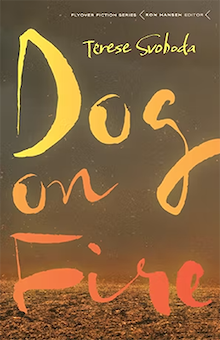Our Research Notes series invites authors to describe their process for a recent book, with “research” defined as broadly as they like. This week, Terese Svoboda writes about Dog On Fire from University of Nebraska Press.
+
Looking Under the Rug: An Essay on Researching Dog on Fire

My new novel Dog on Fire is set in the wild contemporary Midwest, a near-mythical place where nearly anything happens, and where I’ve set several other books. Unlike Bohemian Girl, my last and historical novel which had to be heavily researched in order to find out, for example, what soldiers did all day in those godforsaken forts in the middle of hostile territory, Dog on Fire is contemporary and set in the above familiar territory. Why did I need to research at all?
The ghost in Dog on Fire is epileptic. Although it is not a rare disease – 3.5 million people have it in the US alone – most of the time everyone involved pretends it doesn’t exist, especially families. So I had to do research to confirm my own experience. Surprisingly few novels have epileptics, not to mention epileptic ghosts, as characters. Dostoevsky was an epileptic and gives the malady to Prince Myshkin in the tellingly-titled novel, The Idiot. The hero of Muriel Spark’s The Bachelors is an epileptic handwriting expert who believes the disease has frustrated his ambitions. William Fiennes (cousin of Ralph, the actor) wrote the memoir The Music Room about his epileptic angry brother. He’s particularly good about how his parents coped. These last two books awakened my own memories far more than researching the clinical aspects online. I also learned the history of the malady in Fiennes’ book, how four thousand years ago the Egyptians used bloodletting to control seizures, and how quickly the disease was thought to have occult or magical origin. Nearly always people think epilepsy is a moral failing, and that its manifestations reflect badly on the family. Ah, yes.
Much further along in the writing of Dog on Fire, I realized I didn’t know enough about people who were weight-challenged. I had always assumed they were just like anyone else except for the problem of size, but that doesn’t make a very interesting character. I couldn’t go up to someone, however, and ask How does it feel to be fat? I read online diaries, Kiese Leymon’s Heavy, Roxanne Gay’s Hunger and watched documentaries – and learned of significant complex repercussions. Sure, some weight-challenged people like to be the center of attention, but usually what they get is negative. Cruising the all-you-can-eat table can be excruciating. Since there’s only two reasons for too much body weight: physical, a gland isn’t working properly; and psychological, where weight gain expresses an impossible situation, telling an overweight person they should be thinner insults their intelligence. They know what body image is ideal; they know the physical dangers they face. They are coping.
The most fun I had researching Dog on Fire was hypothesizing how someone might die from jello. Who knew what thirty boxes of jello dissolved and cooled would weigh dropped from a height? Is it possible to choke to death on jello? In the Japanese film Tampopo, an elderly man has to have the jello-like shiroko vacuumed out of his throat because he can’t breathe. Why not freeze it into a dagger? Almost all my ideas left evidence: a crushed skull, chemicals in the blood, a puncture. Hopefully, what I came up with is satisfying.
As for the dog on fire, I did look at images, so sad I had to look away. For a few years, my dad was a district judge in one of the more remote areas of Nebraska and now and then would take me along on his circuit. Once he was called in to determine the fate of three rich kids who’d set a dog on fire. While the county attorney displayed a map with red thread pinned to it showing the dog’s crazed trajectory, he mentioned that the kids’ parents were perfectly willing to buy their way out of their charges rather than be convicted. Dad was not swayed. The punishment should fit the crime, he declared.
Back to Dostoevsky.
+++
Terese Svoboda is the award-winning author of twenty books of poetry, prose, memoir, biography, and translation, including the novel Bohemian Girl (Nebraska, 2011), the memoir Black Glasses Like Clark Kent, and a forthcoming novel, Roxy and Coco.